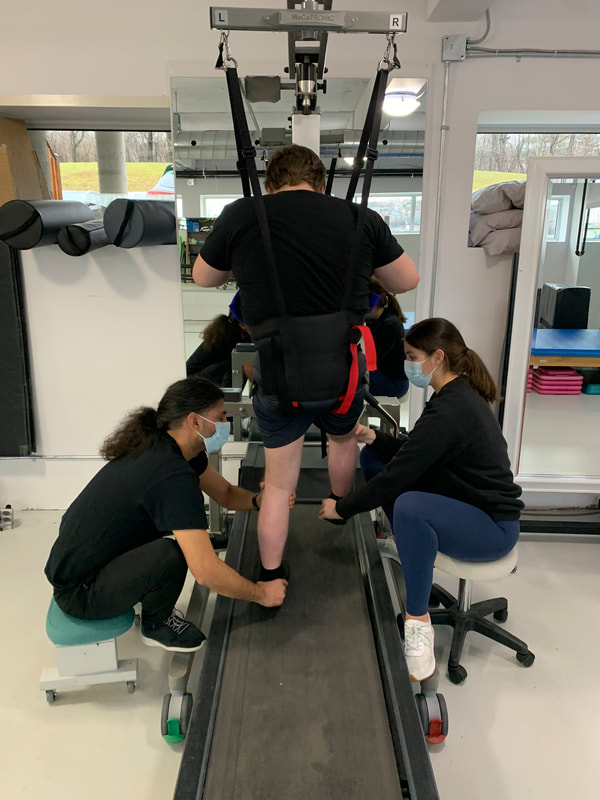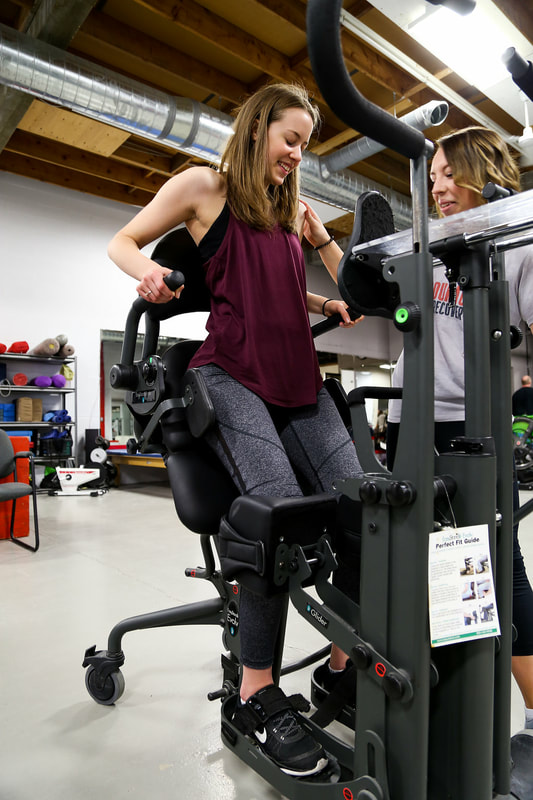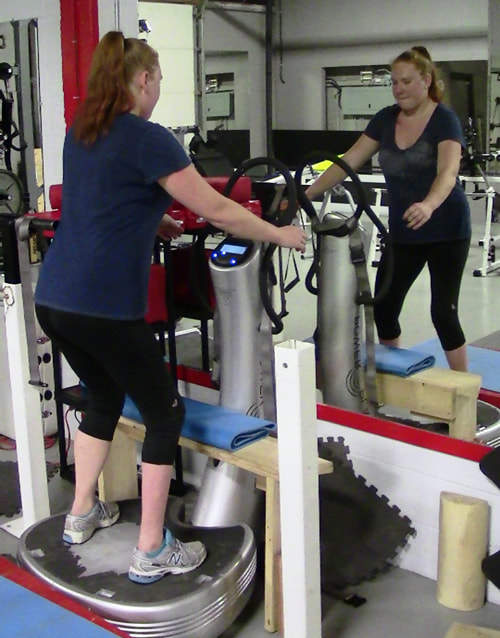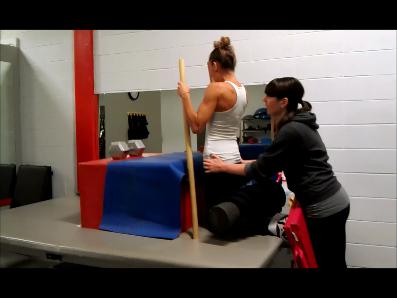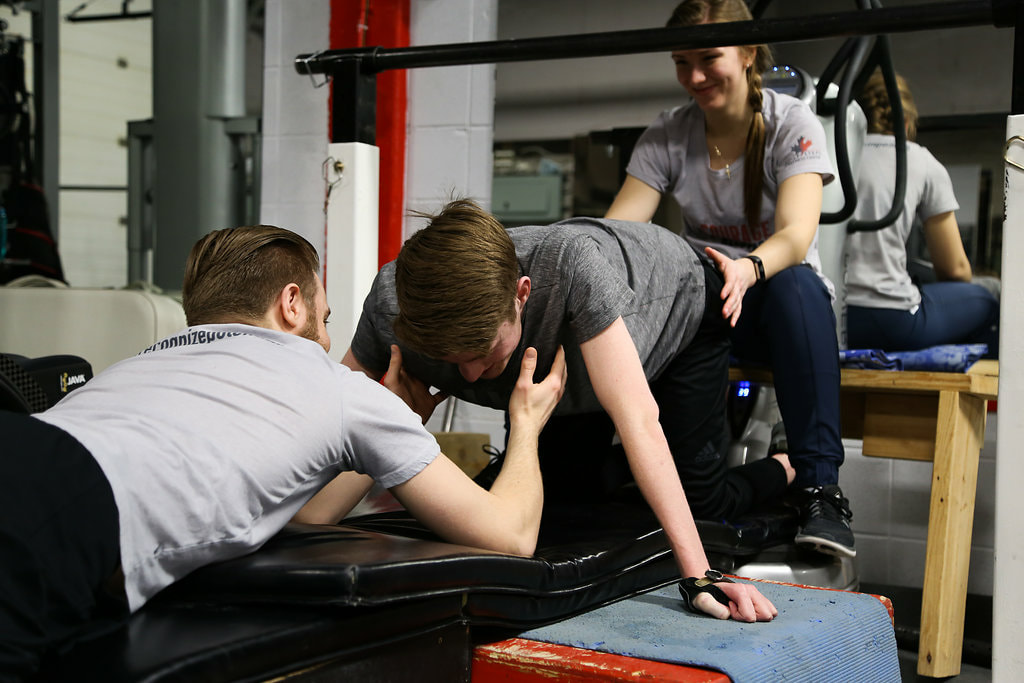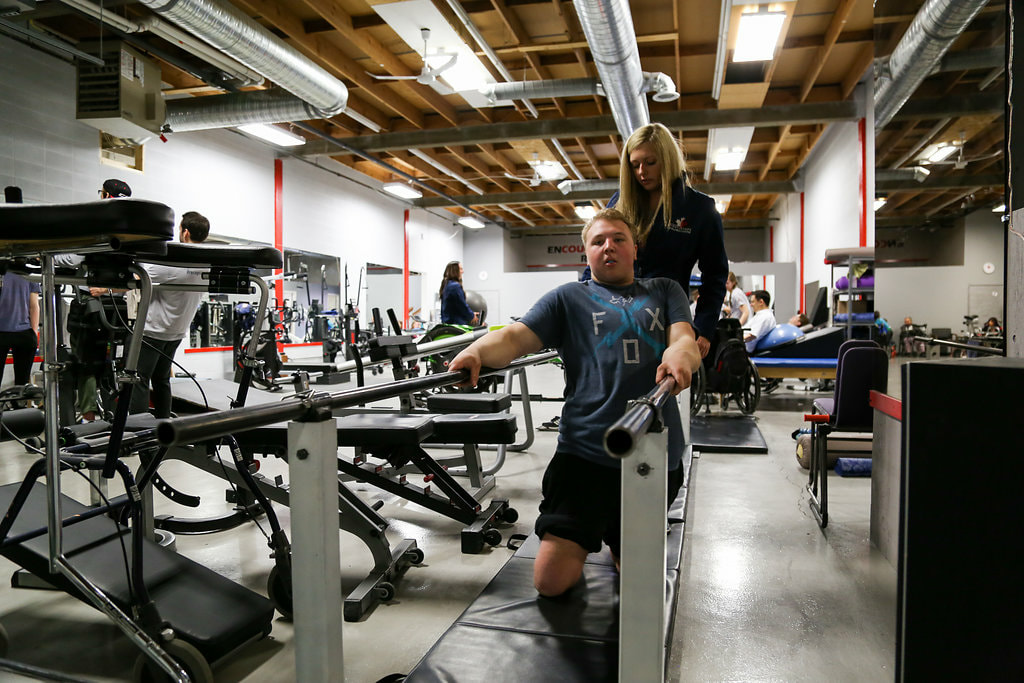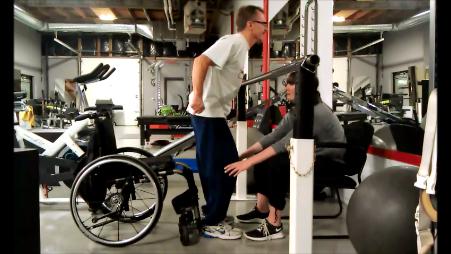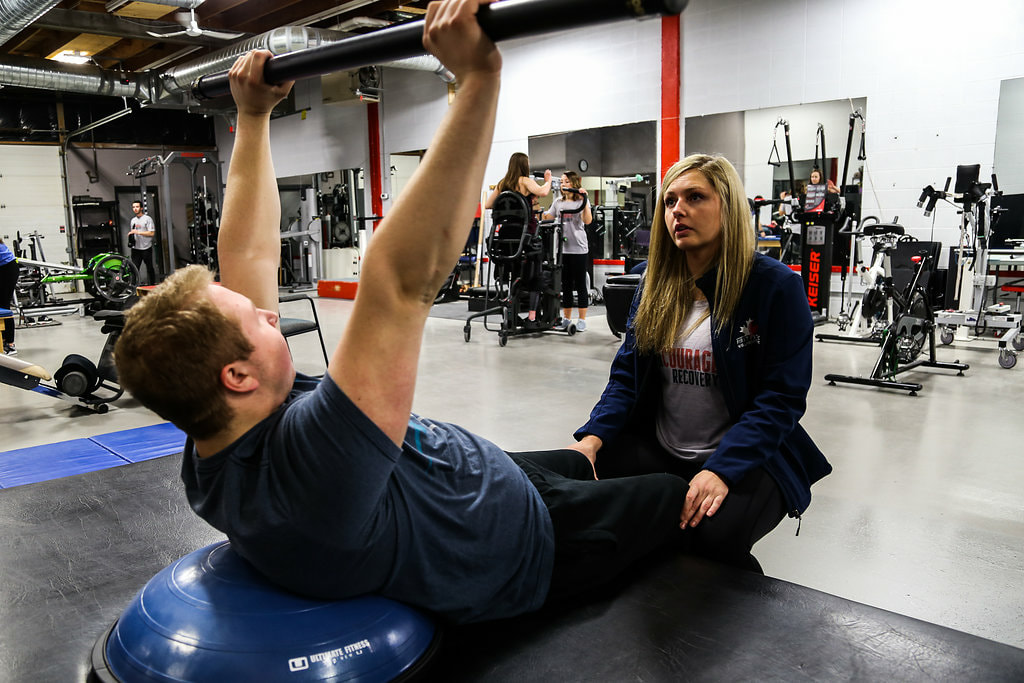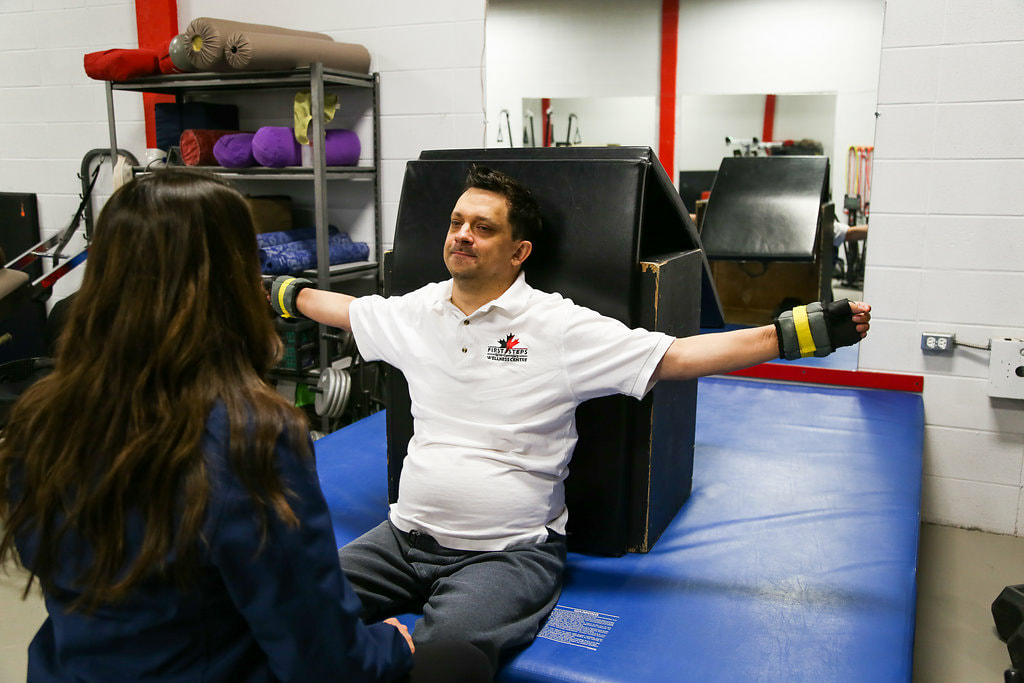Home > Our Program | ABT Program for Spinal Cord injury > Details of the Intensive Activity-based therapy Program
- Study on health care savings
by using the FSWC program (Johnson-Shoyama Graduate School of Public Policy - 2016)
by using the FSWC program (Johnson-Shoyama Graduate School of Public Policy - 2016)
Intensive Activity-based Therapy Program
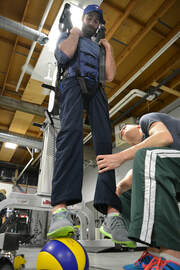
Is it possible to regain the ability to move my arm again, or move my legs again or walk again after a spinal cord injury, or even after the end of the rehabilitation program under the health care system?
Thanks to the advancement of spinal cord injury research in the last 20 years, researchers have provided preliminary evidence to show that the nervous system is not hard-wired but malleable, which is called ''neuroplasticity'', and that function lost due to spinal cord lesions can be recovered even with people with chronic spinal cord injuries.
As the mechanics of neuroplasticity continue to be studied, FSWC has turned these concepts into practical gains for First Steps clients through our one-on-one intensive activity-based therapy program for more than a decade. The practical gains that have been made by First Steps clients in all cases point to the effectiveness of these techniques. We are proud to say that some of FSWC clients have achieved the ability to walk again after spinal cord injury after their long-term hard work and dedication. The results that we have seen regularly are reflected in the significant percentage of our clients who have improved their mobility they were otherwise told they would never be able to do again. This has led to life-changing results for clients, as this can mean the difference between being able to feed oneself again, or even just have the ability to wheel a manual chair as opposed to a power chair. Both of these examples are extremely life changing.
Clients are coming to FSWC in Regina in Saskatchewan from all across Canada including Nova Scotia, Ontario, Manitoba, Alberta, British Columbia, Yukon, and even from the United States and Jamaica. This is telling how unique the FSWC program is.
The 2nd FSWC center in Winnipeg opened in 2020. This renowned program has been available to Quebec families since the opening of FSWC Quebec in 2022.
“Activity-based therapy (ABT) is a group of interventions targeting recovery of sensory and motor function below the level of injury in individuals with spinal cord injury or disease (SCI/D).” Cheung et al., 2022
“Activity-based therapy (ABT) is therapeutic activities that involve ‘repetitive neuromuscular activation below the level of spinal injury, typically achieved through intensive, task-specific movement practice.” MUSSELMAN ET AL. JNER 2018
Thanks to the advancement of spinal cord injury research in the last 20 years, researchers have provided preliminary evidence to show that the nervous system is not hard-wired but malleable, which is called ''neuroplasticity'', and that function lost due to spinal cord lesions can be recovered even with people with chronic spinal cord injuries.
As the mechanics of neuroplasticity continue to be studied, FSWC has turned these concepts into practical gains for First Steps clients through our one-on-one intensive activity-based therapy program for more than a decade. The practical gains that have been made by First Steps clients in all cases point to the effectiveness of these techniques. We are proud to say that some of FSWC clients have achieved the ability to walk again after spinal cord injury after their long-term hard work and dedication. The results that we have seen regularly are reflected in the significant percentage of our clients who have improved their mobility they were otherwise told they would never be able to do again. This has led to life-changing results for clients, as this can mean the difference between being able to feed oneself again, or even just have the ability to wheel a manual chair as opposed to a power chair. Both of these examples are extremely life changing.
Clients are coming to FSWC in Regina in Saskatchewan from all across Canada including Nova Scotia, Ontario, Manitoba, Alberta, British Columbia, Yukon, and even from the United States and Jamaica. This is telling how unique the FSWC program is.
The 2nd FSWC center in Winnipeg opened in 2020. This renowned program has been available to Quebec families since the opening of FSWC Quebec in 2022.
“Activity-based therapy (ABT) is a group of interventions targeting recovery of sensory and motor function below the level of injury in individuals with spinal cord injury or disease (SCI/D).” Cheung et al., 2022
“Activity-based therapy (ABT) is therapeutic activities that involve ‘repetitive neuromuscular activation below the level of spinal injury, typically achieved through intensive, task-specific movement practice.” MUSSELMAN ET AL. JNER 2018
Exercise Below the Level of Injury
We set up customized programs that exercise the entire body, including below the level of spinal cord injury. Our program is set up to increase neuroplasticity as much as possible by working below the level of injury and forcing positive adaptation to movement.
Method
As we focus on improving mobility below the level of injury, our methods differ from traditional rehabilitation which can often take a compensatory approach by maximizing the residual functions.
Our approach is to stimulate a response of the paralysis areas through the rigorous and organized intensive exercises, including highly repetitive and specified movements, weight bearing such as standing and weight supported gait training. FSWC does this by also involving different types of stimulus, including pneumatic resistive/assistive training, vibration training and functional electrical stimulation(*).
Our approach is to stimulate a response of the paralysis areas through the rigorous and organized intensive exercises, including highly repetitive and specified movements, weight bearing such as standing and weight supported gait training. FSWC does this by also involving different types of stimulus, including pneumatic resistive/assistive training, vibration training and functional electrical stimulation(*).
Our clients also repeatedly go through the functional exercises to promote the relearning of developmental movement patterns such as rolling, sitting, kneeling, standing and then walking. Loading weight to the limbs through these developmental movement patterns helps clients gradually rebuild the muscular endurance and strength that are required for a standing position and eventually to learn to walk again.
We also focus on strengthening the core to free their hands and to facilitate daily activities such as sitting alone, manipulating objects by using their hands while sitting. Clients will be out of their chair for almost their entire session.
Competencies of our staff
Last but not the least, the effectiveness of the FSWC method is a direct result of our highly dedicated staffs. Our staff have at least an undergraduate degree in kinesiology or its equivalent and are specially trained at FSWC in Regina, which has provided combined service to people who have spinal cord injuries since 2010.
Through a specific on-site training at the FSWC in Regina, our staff are highly qualified in the area of secondary health problems related to spinal cord injury, including autonomic dysreflexia and orthostatic hypotension. They are repeatedly taught how to detect these symptoms and react in an efficient and safe way with the client. This makes our staff unique specialists of activity-based program.
The FSWC method focuses on recognizing the potential of our clients and challenging them to improve their mobillity.
Through a specific on-site training at the FSWC in Regina, our staff are highly qualified in the area of secondary health problems related to spinal cord injury, including autonomic dysreflexia and orthostatic hypotension. They are repeatedly taught how to detect these symptoms and react in an efficient and safe way with the client. This makes our staff unique specialists of activity-based program.
The FSWC method focuses on recognizing the potential of our clients and challenging them to improve their mobillity.
Practical Gains using the FSWC Activity-based Therapy
The goal of FSWC Québec is to get our clients as mobile as possible. Our intensive activity-based therapy helps clients to halt muscle atrophy and to improve mobility below their level of injury.
Improving mobility can be a slow process to begin with and there is no miracle. There is no realistic way to predict how long it will take to see improvement or what improvement can be realized. This depends on the severity of the injury, the age of the person injured, how motivated the client is and other factors. Most research is indicating that the first six months following an injury is when a majority of changes occur so the time from injury to therapy is a great factor as well. Typically it seems at around the 6 month mark that nerves begin to refire and feeling in body parts begins to come back, assuming that attendance is somewhere in the neighborhood of 12-15 hours/week. It is common for clients at FSWC Regina to follow the intensive program for 8 to 24 months or until they are satisfied with the improvement that they have made or reached the goals they have set.
In exchange for long-term hard work, FSWC clients have seen many positive life-changing improvements in the following ways: improving the ability to perform activities such as feeding yourself or doing transfers or lifts that had previously required a caregiver, replacing an electrical wheelchair to manual wheelchair, reducing secondary health complication such as: reduced respiratory complications, reduced muscle spasm, reduced pain, prevention of muscular atrophy.
Mental health is another notable gain at First Steps. Can you imagine how hard mentally is it to be told that you would never walk again? Exercise is one of the best ways to combat depression or anxiety and all First Steps clients will attest to the fact that mental health is important for people who have sustained a spinal cord injury. Our facility provides the opportunity for peer to peer interaction to share experiences, advice, and resources. At FSWC, you’re considered part of our extended family.
Improving mobility can be a slow process to begin with and there is no miracle. There is no realistic way to predict how long it will take to see improvement or what improvement can be realized. This depends on the severity of the injury, the age of the person injured, how motivated the client is and other factors. Most research is indicating that the first six months following an injury is when a majority of changes occur so the time from injury to therapy is a great factor as well. Typically it seems at around the 6 month mark that nerves begin to refire and feeling in body parts begins to come back, assuming that attendance is somewhere in the neighborhood of 12-15 hours/week. It is common for clients at FSWC Regina to follow the intensive program for 8 to 24 months or until they are satisfied with the improvement that they have made or reached the goals they have set.
In exchange for long-term hard work, FSWC clients have seen many positive life-changing improvements in the following ways: improving the ability to perform activities such as feeding yourself or doing transfers or lifts that had previously required a caregiver, replacing an electrical wheelchair to manual wheelchair, reducing secondary health complication such as: reduced respiratory complications, reduced muscle spasm, reduced pain, prevention of muscular atrophy.
Mental health is another notable gain at First Steps. Can you imagine how hard mentally is it to be told that you would never walk again? Exercise is one of the best ways to combat depression or anxiety and all First Steps clients will attest to the fact that mental health is important for people who have sustained a spinal cord injury. Our facility provides the opportunity for peer to peer interaction to share experiences, advice, and resources. At FSWC, you’re considered part of our extended family.
Study on health care saving
by using the FSWC program (Johnson-Shoyama Graduate School of Public Policy - 2016)
| study_on_health_care_saving_by_using_the_fswc_program.pdf |

